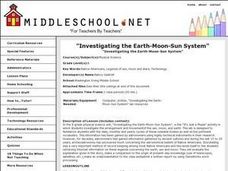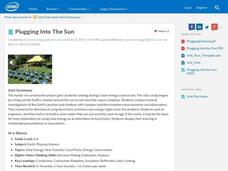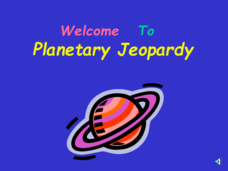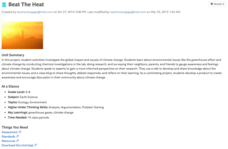Curated OER
Investigating the Earth-Moon-Sun System
Eighth graders research Native American legends involving the sun, moon, and stars and compare them to the origin of present day knowledge. They create a written report and make an oral presentation of their findings to the class.
Columbus City Schools
Moon Phase Mania
Now you see it, now you don't. Our moon seems to pull a disappearing act from time to time—but why? Take your seventh grade scientists above and beyond to discover the truth about the moon and the role it plays in Earth's little corner...
Intel
Plugging into the Sun
What's cooking? A sizzling STEM unit challenges scholars to build a solar cooker that can successfully cook an egg. The unit opens with a study of Earth's rotation, the sun's energy, and shadows. Pupils use a compass and thermometer to...
Port Jefferson School District
Climate Patterns
Young climatologists explore the factors that contribute to a region's climate in this two-part earth science activity. To begin, learners are provided with a map of an imaginary planet and are asked to label global wind and ocean...
Alabama Learning Exchange
Our Restless Planet
Students examine the topic of the Earth's rotation, revolution, and orbit. They observe teacher-led demonstrations, explore various websites, write journal entries, conduct a demonstration of why Earth experiences day and night, and...
Curated OER
Spinning into Space
Students, through hands-on activities, teacher demonstrations, pictures, and informational books, complete a unit on the Earth and its place in the Universe. They make mobiles of the Milky Way and watch demonstrations of lunar and solar...
Curated OER
Who Will Care for the Water?
Learners discover how humans impact natural resources. In this environmental instructional activity, students identify water resources in the local area and construct a T-chart to compare the positive and negative effects humans have on...
Core Knowledge Foundation
A Time for All Seasons - Summer
The sun is shining and the birds are singing, what better time to teach young learners about the fun season of summer. In this week-long science series, children learn how the rotation and orbit of the earth influence the days and...
Core Knowledge Foundation
A Time for All Seasons - Winter
As the days get shorter and a chill enters the air, it's time to start teaching your little ones about the wondrous winter season. Through a series of teacher demonstrations, whole-class read alouds and discussions, and hands-on...
Core Knowledge Foundation
A Time for All Seasons - Fall
The weather is cooling down and the leaves are starting to change color; fall is right around the corner. Celebrate this special time of year with this earth and life science lesson series that teaches children about the causes of...
Curated OER
Rocks and Their Properties: Day 5
Students demonstrate their knowledge of rock formation processes in varied ways by sharing their cooperative research projects with the class. They generate well-framed questions in response to each presentation.
Curated OER
Lesson 2 Its a Small World (Day 2)
Students are able to explain how the water cycle recycles the earth's water supply. They are able to make use of the knowledge of land forms learned in social studies. Students are able to form a hypothesis on how/why the water cycle...
Curated OER
GPS Treasure Hunt for Knowledge
Students examine themselves as being part of a global community. In this global community lesson, students investigate GPS systems. Students gain knowledge on how the device works. Students discover that satellites provide information...
Curated OER
The Starry Night Time and Day Time
Second graders complete a unit of lessons on the solar system. They complete various art projects inspired by Van Gogh's 'Starry Night,' create a moon phases book, create a moon phase wind chime, develop a timeline of space exploration,...
Curated OER
Earth, Moon and Sun Assessment Test
In this space science worksheet, students answer 14 essay questions pertaining to the Earth, moon, and sun and their relationship. Prior knowledge is assumed, or this could be a pre-test.
Curated OER
Modeling Day and Night
Students complete a science experiment to study the role of night and day on sleep patterns. In this sleep patterns instructional activity, students brainstorm about night and day and the causes for the rotations on Earth. Students work...
Columbus City Schools
Planet X
How did the earth become the mass that it is now? Your young scientists explore this question through the concept of density. Their inquiries consider the impact of gravity on the formation of planets. The culminating activity of the...
US Environmental Protection Agency
Water Purification by Evaporation and Condensation
This easy-to-perform demonstration shows students how the water cycle, specifically the processes of condensation and evaporation, purifies Earth's water supply. Just mix up some water, dirt, and gravel in a glass bowl, place a cup in...
Curated OER
Planetary Jeopardy!
Space Science can be so much fun, especially when you play Planetary Jeopardy! This game tests students on what they know about Roman Gods, the planets and moons in our solar system, and the Earth's rotation.
University of Colorado
Strange New Planet
The first remote sensors were people in hot air balloons taking photographs of Earth to make maps. Expose middle school learners to space exploration with the use of remote sensing. Groups explore and make observations of a new planet by...
University of Colorado
Distance = Rate x Time
Every year, the moon moves 3.8 cm farther from Earth. In the 11th part of 22, classes use the distance formula. They determine the distance to the moon based upon given data and then graph Galileo spacecraft data to determine its movement.
Intel
Beat the Heat
Explore greenhouse effect and climate change through a 15-day unit. Scholars learn about these STEM concepts by researching, conducting surveys, experimenting, and collaborating with experts in the field. They frequently communicate...
PBS
The Lorax
Accompany a reading of Dr. Seuss' tale, The Lorax, with a five-item worksheet. Questions challenge scholars to list characters' names, use text details to answer inquiries, and describe the moral of the story.
Curated OER
An Introduction to the Night Sky and Movement Astronomy
Basically, this is an interactive exploration of educational astronomy software and an app. Young astronomers discover how the apparent motion of the sky relates to Earth's movements and the position of the observer. It is out of this...

























